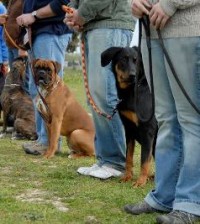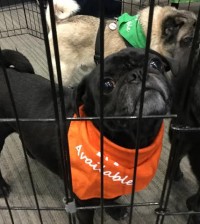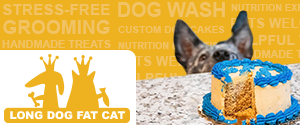- Do you subscribe to Dharma Dog Training’s Newsletter? You should.
- A Unique Campaign from The Humane Society of the United States
- Rabid bats in Omaha- Stay safe, prepared with these tips
- Springtime Activities in Omaha
- Mill Dog Monthly from Bailing Out Benji
- World Spay Day, Legislative Alert in Nebraska
- Attend the Nebraska Rescue Council’s monthly meeting this Saturday
- Five Hard-to-Ignore Reasons to Adopt!
- Paws in Pink to Benefit Breast Cancer Foundation
- VCA, Inc. Acquires MidWest Vet Specialists from Kansas State University
Help with housebreaking your new puppy
A huge step in raising your new puppy is successfully housebreaking it. What exactly is “housebreaking?” It’s the process of training your dog that the house is a place to relax, play, sleep- and not a place to potty. Outside is for potty time, not inside. This process can be laboring, frustrating at times, and lengthy, but we’ve got some helpful hints on how to make it easier. From the web, we’ve gathered a number of tips and best practices for you to consume and put into use as you work to housebreak your new pup.
It seems inevitable at this point, but he’s a great resource, so we’ll keep borrowing advice from him. Cesar Millan is one of the world’s most widely-known and respected dog trainers. In a recent article he has written on housebreaking your dog, which you can find here, he gives many tips. We’ve hit the high points below in a quick summary.
- Don’t expect results overnight. Cesar says that a dog’s “natural programming” allows them to grasp the concept of potty outside, not inside anywhere from 2-4 months of age.
- It only takes 5-30 minutes for a dog’s digestive tract to process recent and previous meals, so expect a need to go outside fairly quickly after eating. After feeding your pup, observe and pay attention for any signs that he or she needs to go. If you take the dog outside at the right time, it will get used to this routine and time frame of eating and going outside soon after.
- Take your dog to an approximate area in your yard every time you go outside. The scent of previous “eliminations” will remind them what they are there for and will encourage them to take care of their business when you take them to their potty place. Familiarity and routines are very important and will surely speed up the process.
- When the dog goes outside, make sure to reward him or her. Positive reinforcement is a key to getting your puppy to realize what they’ve done.
- When you take the dog out, don’t screech at them to “GO POTTY! GO POTTY!” This can create anxiety and confusion for the dog. Cesar suggests that you simply take the dog to their potty place without conversation- simply go and let them do their doodie- ha ha, get it?!
- Realize and accept that there will be accidents. Don’t scold your puppy- they don’t know what they’ve done. Simply clean up, stay the course, and keep working with your pup on getting it down.
These are all wonderful tips, and upon looking around the web for more information, we found that these are pretty universal. It was difficult to find many other sites or articles that recommended anything more or anything different- Cesar knows his stuff. We did find another article from the Gaston Gazette that had some more great tips on housebreaking your little buddy. Follow this link for the complete article, but check below as we’ve again hit the high points for you.
- Be vigilant, patient, committed and consistent. Your dog is relying on your for help, and if you don’t give it to them, you will both struggle with the process of knowing where we go potty.
- The article suggests, like Cesar did, that routines are very important. Take your pup out frequently, and especially right after a nap, some play inside the house, and eating or drinking.
- The Gazette also agrees with Cesar in that finding a regular “potty spot” is important. One addition they made to this process is the act of taking the dog there on a leash just to make sure they can smell their place to go and get used to going in a familiar spot.
- Remove food and water from puppy’s reach at bedtime. This will lessen the likelihood that you will have to get up during the night or wake up to an accident. Make sure your puppy makes an effort to go right before going to sleep, too. An interesting note: if a puppy is three months old, they can typically “hold it” for three hours. If the puppy is four months old, they can hold it for four hours. See the pattern? Pay attention to this and be proactive if you have any concerns over potential accidents during the night.
- Supervise your dog while in the house and watch for signs of needing to go like squatting, pacing, and discomfort. When you can’t watch your pup directly, confine them to a smallish place. This small area, like a bathroom or crate, may prevent them from going as they must stay there in the presence of the waste. Another interesting note: Puppy’s are cleaned by their mothers for the first few weeks after birth. This eliminates the smell of urine, feces, and other bad smelling things, teaching the pup that the area in which they sleep or relax is not a place they should “go.” This fact of nature is helpful in the process of housebreaking.
We’d like to say that these are but a few tips and tricks to housebreaking your dog, but the above list is actually pretty universal and all-encompassing. The only other tip we’d give you that didn’t appear in these articles is to get a “potty pad.” This is a pad that you can put inside a crate that will absorb any excrement and they are easy to clean up. If your dog makes a mistake and goes inside, hopefully they use the pad. Many of our sponsors and partners sell products like these, so if you are in need, check them out via our Directory page.
Good luck with training your new puppy! Remember, it is a process, just like with children, so be patient, be proactive, and be understanding. This is part of owning a puppy, so don’t get frustrated if accidents happen. The process doesn’t have to be hard- follow the tips above and your pup should be trained by the age of just a few months. Do it right and you won’t have to worry about potty problems for very long.
Have other tips or experiences with potty training? Comment below or tweet them to us @PetsInOmaha. Happy training!
While you’re at it, check out 30 Awesome Puppy Care tips here!
Related Posts
Latest News
-
3 Tips for Pet Owners on Training Rescue Dogs
Owning a rescue dog can take some work compared to...
- Posted 3 weeks ago
- 0
-
Choosing the Right Pet for Your Lifestyle
Are you thinking about getting a pet but unsure what...
- Posted 1 month ago
- 0
-
How to Make Your Rescue Pet as Comfortable as Possible
Did you bring home a new pet from a shelter...
- Posted 2 months ago
- 0
-
How Having A Pet Can Change Your Life
Having a pet can open your heart in ways that...
- Posted 7 months ago
- 0
-
How To Improve The Life Of Your Senior Pet
Do you have an elderly fur baby and want to...
- Posted 7 months ago
- 0
-
Springtime Activities To Enjoy With Your Furry Friends
Are you preparing for warmer weather and want some ideas...
- Posted 8 months ago
- 0
-
Pros And Cons Of Microchipping Your Pets
Have you considered whether your pets should be microchipped and...
- Posted 9 months ago
- 0






















You must be logged in to post a comment Login